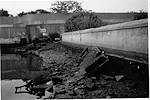Transportation & Environmental Justice

|
over mode, route, origin, and destination, affect every part of our lives. They determine where we live, work, shop, and play. These decisions can result in drastic changes for communities, with some receiving all the benefits while others receive all the burdens. Since transportation systems have typically been planned with the wealthy and the powerful in mind, it is primarily low-income communities and communities of color who have borne most of the burdens. New York City is no exception. |
The Vision
Transportation should bring advantages to communities not hardship. The members of the New York City Environmental Justice Alliance are working to create a transportation system that promotes safety, health, and accessibility equally for all communities.




Making Streets Safer
Truck Watch — a community-based truck-monitoring study undertaken by NYCEJA members to document levels of truck traffic, usage of illegal routes, and illegal engine idling. Monitoring has taken place in the South Bronx (The Point CDC and We Stay/Nos Quedamos); Sunset Park, Brooklyn (UPROSE); and Long Island City, Queens (Community Environmental Center).
Traffic Calming and Community-Friendly Truck Routes — NYCEJA members and other members of the Communities First Transportation Coalition are working to ensure that New York City’s truck routing network is redesigned with the health and safety of communities as its primary goal. We advocate for the inclusion of speed humps, medians, and other changes in street design that force changes in driving behavior and make streets safer.
Promoting Alternatives
Melrose Station — We Stay/Nos Quedamos is working to rehabilitate a South Bronx commuter rail station and increase the level of service at that station. A rehabilitated Melrose Station would enable reverse commuting, allowing South Bronx residents to take advantage of job opportunities in suburban counties.
Green Port for Sunset Park — The United Puerto Rican Organization of Sunset Park is campaigning to turn the City’s plans for the local Port into a model "Green Port," complete with park space, landscaping, rail access, traffic calming devices, and clean-fuel requirements for trucks.
Dump Dirty Diesels Campaign — As part of the Clean Fuels Bus Coalition NYCEJA is working to get New York City to convert from using diesel buses to those that use cleaner fuels such as compressed natural gas.
Sheridan Park vs. Sheridan Expressway — NYCEJA and member organizations The Point CDC and We Stay/Nos Quedamos, as well as Youth Ministries for Peace & Justice and the Tri-State Transportation Campaign are campaigning to turn the little-used 1.25 mile Sheridan Expressway in the South Bronx into a 68 acre riverfront park.
Greenways & Bike Paths — Bicycles are a non-polluting and inexpensive way to travel. On-street bicycle lanes also act as traffic-calming devices, while greenway development means more park space and public access to waterfronts. NYCEJA is working to get bike lanes and greenways in low-income communities of color.
Building Coalitions
NYCEJA is also a member of the Neighborhood Streets Network; the Clean Fuels Bus Coalition; and the Tri-State Transportation Campaign a coalition of groups in the New York, New Jersey, and Connecticut region.
MTA Capital Plan Fact Sheet: Part 1- Buses
MTA Capital Plan Fact Sheet: Part II - Commuter Rail